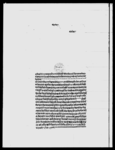A lālamohara from King Rājendra re a land grant to Copadāra Vaṃśīdhara Lāmichānyā (VS 1887)
ID: DNA_0013_0053
Edited and
translated by Rajan Khatiwoda, Ramhari Timalsina
Created: 2017-07-10;
Last modified: 2017-08-10
For the metadata of the document, click here
The accompanying edition, translation/synopsis and/or commentary are available under the terms of the Creative Commons Attribution-ShareAlike 4.0 International License
Abstract
This lālamohara issued by King Rājendra to Copadāra Vaṃsidhara Lāmichānyā deals with a land grant made to the latter on the occasion of the former's initiation (upanayana).Diplomatic edition
[1r]
श्रीदुर्गाज्यूः \श्रीसर्वेश्वर[royal seal]1स्वस्तिश्रीगिरिराजचक्रचूडामणिनरनारायणेत्यादि•विविधविरुदावली•विराजमानमान्नोत•2श्रीमन्महाराजाधिराजश्रीश्रीश्रीमहाराजराजेंद्रविक्रमसाहवहादूरसम्सेरजङ्गदेवानां
3सदासमरविजयीनाम्¯¯¯ ¯¯¯ ¯¯¯ ¯¯¯ ¯¯¯ ¯¯¯ ¯¯¯ ¯¯¯
4आगे•चोपदारवंसिधरलामिछान्याकेसंवत्१८८०सालमितिमाघशुदि५रोज५कादिन•हा
5म्रा•उपनयनमा•वाहुलीवाटसंकल्पभयाकोंषेतमध्येषेतमुरि।२०तस्कोसरहवमोजीमको
6घड्यारिस्मेत्विर्त्तागरिवक्स्याकोमोहरताम्वापत्रगरिवक्स्यौं•पाटनकाअंवलमध्येमनोहरा•म
7ग•षेतमुरि।२०घड्यारिपाषोमुरि।४तस्कोसाँधपूर्व•रैकर•षेतकोआलीसाँधलुहुकील•द
8छिन•उत्तर•सिद्धपुरिकोविर्त्ताषेतकोआलीसाँधलुहुकील•पश्चिम•सानुवाटोसाँधलुहुकी
9ल•एतिसिमानाभित्र•घड्यारिमुरि।४पाषाकोपानीषेतदिदाडेढोघटाई•षेतमुरि२।१३।२
10।६षेतघड्यारिज्मामुरिवाईस्•पाथितेह्र•मानादुई•मुठीछकापैदावारले¯¯ ¯¯ ¯¯ कोगुठी
11चलाई•हाम्रोजयमनाई•विर्त्ताजानि•संतानदरसंतानपर्यंतपरमसुषभोग्यगर•योविर्त्ता
12संकल्पहुदा•संकल्पवाक्यपह्र्न्यापुरोहित•रघुनाथपंडितअर्ज्याल•पानीहालन्याकाजीद
13लभन्जन्पाडेँ•साधलाउन्यासधियार•थरघरमोदनाथअर्ज्याल्•मित्रसर्मापंथ•गोकु
14लषनाल्•मेहर्सिंवोहरा•व़वाहाटोलको•विंनर्सिं•डगोल•विज्यापूरको•पुनसिंडगोल•मोहि
15नाईक्यालाष्याँ•जसरामभागिदत्त•पुनसिरि•भीमनारान्•सिनामुगलका•दामोदरदाहा
16ल•रविवाँसकोटा•रामभद्रघिमिर्या•वनमालीसुवेदी•काल्यानगार्चि•जसकर्ण्याभेरिवा़ल
17विर्त्तवा़रलेकिलाभन्दा•अर्घ्यालोनचापनु•विनातक्सीरजवदनगर्नु•जोएसवंधेजमार
18होईन•सोएसश्लोकमाभन्याकोपातकीहोला•स्वदत्तांपरदत्तांवायोहरेद्वैवसुंध
19राम्•षष्ठीवर्षसहस्त्राणिविष्टायांजायतेक्रिमिः॥ईतिसंवत्१८८७सालमिति
20फालगुनवदि६रोज५शुभम्¯¯¯¯¯¯¯¯¯¯¯¯¯¯¯¯¯¯
Translation
[1r]
[[synopsis]]
This lālamohara issued on Thursday, the 6th day of the dark fortnight of Phālguṇa in the Vikrama era year 1887 by King Rājendra to Copadāra Vaṃsidhara Lāmichānyā deals with a land grant made during the auspicious occasion of the former’s initiation (upanayana). It states that the land grant together with a ghaḍerī was made on the occasion of the initiation of Rājendra in his own hand in the form of a ritual declaration (saṅkalpa) on Thursday, the 5th day of the bright fortnight of Māgha in the Vikrama era year 1880. It further states that the [lāla]mohara was engraved on copper. According to the description of the land in the document, it was located in an area of Patan. The document tells us that the land grant was meant to support the guṭhī of a Sarveśvara-temple. The addressee of the document, Copadāra Vaṃsidhara Lāmichānyā is directed to run the guṭhī from the usufruct of the granted land, celebrate King Rājendra's victories and enjoy the land from generation to generations as a birtā. The document further lists the following people who have been involved during the process of granting the land or marking its boarders: the reciter of the ritual-declaration was the royal preceptor Raghunātha Paṇḍita Arjyāla; the pourer of water was Kajī Dalabhañjana Pā̃ḍe; those marking the boarders who were members of the six noble families (tharaghara) were Modanātha Arjyāla, Mitra Sarmā Paṃtha, Gokula Khanāla and Meharsiṃ Boharā; and those other than members of the six noble families were Viṃnarsiṃ Ḍagola of Babāha Ṭola, Punasiṃ Ḍagola of Vijyāpūra (i.e., Vijayapūra), Mohi Nāīkyā Lākhyā̃ Jasarāma, Bhāgidatta Puna, Bhīmanārān, Dāmodara Dāhāla of Sināmugala, Ravi Vā̃sakoṭā, Rāmabhadra Ghimiryā, Vanamālī Suvedī, Kālyā Nagārci and Jasakarṇyā Bherivāla. Furthermore, the document stipulates that the holder or holders of the land should not encroach on the land beyond the fixed boundaries, and no one is to seize the granted land unless a crime has been committed which warrants such punishment. It finally cites a verse stating: “Whoever seizes land given by himself or by others will be a worm in excrement for sixty thousand years.

